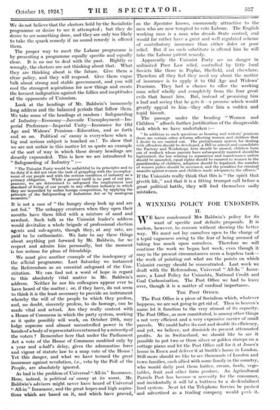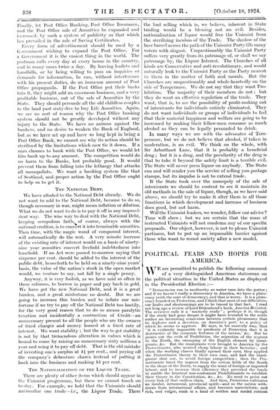A WINNING POLICY FOR 'MONISTS.
WE have condemned Mrs Baldwin's policy for its want of specific and definite proposals. It is useless, however, to censure without showing the better way. We must not lay ourselves open to the charge of a tepid vagueness owing to the fear of being accused of taking too much upon ourselves. Therefore we will continue the work we began last week, even though it may in the present circumstances seem a hopeless task— the work of pointing out what are the points on which Unionist energy should be concentrated. Last week we dealt with the Referendum, Universal " All-In " Insur- ance, a Land Policy for Unionists, National Credit and Coal Carbonization. The Post Office we had to leave over, though it is a matter of cardinal importance.
THE POST OFFICE.
The Post Office is a piece of Socialism which, whatever happens, we are not going to get rid of. Then in heaven's name let it function to the very utmost of its capacity: The Post Office, as now constituted, is among other things a not very efficient and a very expensive carrier of small parcels. We could halve its cost and double its efficiency, and yet, we believe, not diminish its present attenuated profits. As in Switzerland, we should like to see it possible to put two or three silver or golden stamps on a cottage piano and let the Post Office call for it at Jones's house in Essex and delivorit at Smith's house in London. Still more should we like to see thousands of London and town families, each allied with some family in the country, who would daily post them butter, cream, fowls, vege. tables, fruit and other farm produce. An Agricultural Parcels Post has become a necessity for the consumer, and incidentally it will bi a buttress to a de-feudalized land system. Next let the Telephone Service be pushed and advertised as -a trading company would push it. Finally, let Post Office Banking, Post Office Insurance, and the Post Office sale of Annuities be expanded and increased, by such a system of publicity as that which has prevailed in the sale of Saving Certificates.
Every form of advertisement should be used by a Government wishing to expand the Post Office. For a Government it is the easiest thing in the world. The postman calls every day at every house in the country, and in many cases twice a day. By leaving leaflets and handbills, or by being willing to pass on inquiries or demands for information, he can, without interference with his present duties, do an immense amount of Post Office propaganda. If the Post Office put their backs into it, they might add an enormous business, and a very profitable business, out of the sale of Annuities by the State. They should persuade all the old childless couples in the land past sixty-five to buy Life Annuities. Again, we see no sort of reason why the Post Office banking system should not be greatly developed without any injury to the State. We have no animus against the bankers, and no desire to weaken the Bank of England, but as we have set up and have so long kept in being a Post Office Bank, we cannot see why its action should be sterilized by the limitations which now tie it down. If a man chooses to bank with the Post Office, we would let him bank up to any amount. The competition would do no harm to the Banks, but probably good. It would prevent them from falling into the lethargy that attacks all monopolists. We want a banking system like that of Scotland, and proper action by the Post Office ought to help us to get it.
'THE NATIONAL DEBT.
We have alluded to the National Debt already. We do not want to add to the National Debt, because to do so, though necessary in war, might mean inflation or dilution. What we do not want to do is to pay it off in any improvi- dent way. The wise way to deal with the National Debt, keeping scrupulous faith,.. of course, always with the national creditor, is to convert it into terminable annuities. Then time, with the magic wand of compound interest, will automatically do the rest. A very minute increase of the existing rate of interest would on a basis of ninety- nine year annuities convert freehold indebtedness into leasehold. If an Act were passed to-morrow saying that sixpence per cent. should be added to the interest of the public debt, henceforth to be held on a ninety-nine years' basis, the value of the nation's stock in the open market would, we venture to say, not fall by a single penny.
Anyway, it is very foolish, as we have said so often in these columns, to borrow in paper and pay back in gold. We have got the new National Debt, and it is a great burden, and a great misfortune no doubt. But we are going to increase this burden and to inflate our mis- fortune if we try to pay off the National Debt too hastily, for the very good reason that to do so means paralytic taxation and incidentally a contraction of Credit—an unnecessary present to all the people who are the owners of fixed charges and money loaned at a fixed rate of interest. We want stability ; but the way to get stability is not by that tremendous alteration in values which is bound to come by raising an unnecessary sixty millions a year and using it to pay off debt. That is the old mistake a investing one's .surplus at 4i per cent., and paying off the company's debenture shares instead of putting it back into the business and making 15 per cent.
THE NATIONALIZATION OF THE LIQUOR TRADE.
There are plenty of other items which should appear in the Unionist programme, but these we cannot touch on to-day. For example, we hold that the Unionists should nationalize one trade—i.e., the Liquor Trade. There the bad selling which is, we believe, inherent in State trading would be a blessing not an evil. Besides, nationalization of liquor would free the Unionist from the sterilizing incubus of the Trade. The shadow of the beer barrel across the path of the- Unionist Party fills many voters with disgust. Unquestionably the Unionist Party suffers very greatly from its patronage of, or shall we say patronage by, the Liquor Interest. The Churches of all kinds are Conservative and anti-revolutionary, and would naturally look to the Unionist Party as the Party nearest to them in the matter of faith and morals. But the Churches are unquestionably and whole-heartedly on the side of Temperance. We do not say that they want Pro- hibition. The majority of their members do not ; but they do want an effective regulation of the trade. They want, that is, to see the possibility of profit-making out of intoxicants for individuals entirely eliminated. They do not want individuals or groups of individuals to feel that their material happiness and welfare are going to be increased by making their fellow-men consume as much alcohol as they can be legally persuaded to drink.
In many ways we are with the advocates of .Tem- perance, but we do not believe that alcohol, if taken in moderation, is an evil. We think on the whole, with Sir Arbuthnot Lane, that it is probably a beneficial drug ; but it is a drug, and the peculiarity of the drug is that to take it beyond the safety limit is a terrible evil. The State will never press liquor on anybody. The State can and will render you the service of selling you postage stamps, but its impulse is not to extend trade.
If the State took over the monopoly of the sale of intoxicants we should be content to see it maintain its old methods in the sale of liquor, though, as we have said above, we should try to make it alter them in all those functions in which development and increase of .business does good, but not harm.
Will the Unionist leaders, we wonder, follow our advice? Time will show ; but we are certain that the mass of instructed Unionists will not condemn any of our specific proposals. Our object, however, is not to please Unionist partisans, but to put up an impassable barrier against those who want to recast society after a new model.



























































 Previous page
Previous page